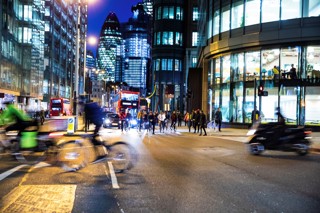The Urban Mobility Partnership is urging all 44 public bodies in Wales to ban the use of private cars for business purposes.
Simply by using lease cars and ‘car clubs’ instead of the so-called ‘grey fleet’, Wales could reduce the amount of emissions from those journeys by 42%, it says.
Statistics revealed by Freedom of Information requests show that this could save the four largest local authorities in Wales (Rhondda Cynon Taf, Newport, Swansea and Cardiff) more than £2.8 million a year.
The Urban Mobility Partnership will be briefing Welsh ministers and government officials at a specially convened summit later today.
It also says that mobility credits for use on buses, trains and daily car and bike hire could cut congestion and improve air quality.
Deputy minister for economy and transport Lee Waters AM will hear how giving people mobility credits could be the answer to air quality and traffic problems at the Sustain Wales Summit just days after the Welsh Government declared a climate emergency.
The Urban Mobility Partnership is a group of organisations that are seeking to create an integrated, national, multi-mode transport policy that puts the needs of consumers at its heart, while improving air quality and reducing congestion.
Mobility credits work by people trading in their older, more polluting cars and rather than being given cash, they would receive mobility credits in excess of the market value of the car, for use on a range of clean and efficient modes of transport.
The credits would be in the form of Netflix-style application that can be used for journeys using trains, buses, car clubs and bike hire. This mobility as a service (MaaS) approach is being trailed in Manchester by Enterprise and Stagecoach and funded by Imove from the European Union to provide transport on demand across a variety of modes to Manchester Airport Group staff.
Mari Arthur, director of Cynnal Cymru who is chairing the meeting, said: “The Extinction Rebellion protests have prompted a lot of discussion about environmental issues in recent weeks and prompted the Welsh Government to declare a climate emergency. Today, we’re hearing about practical responses to tackle that emergency.
“Wales has long led the way on sustainability. Now is a chance to create viable alternatives to private car ownership, and encourage people to scrap their older, polluting cars and get them into more efficient vehicles and modes of transport.
“We need radical solutions to change behaviour, tackle air pollution and climate change; mobility credits gives Wales an opportunity to once again lead the UK on sustainability actions.”
Ben Lawson, from the Urban Mobility Partnership and vice president of Strategy for UK and Ireland at Enterprise Holdings, said: “Enterprise established the urban mobility partnership with key transport partners to look at multi-modal solutions that can be implemented in the short and medium term to improve air quality and reduce congestion.
“Working with national government and local authorities we are developing collaborative policy solutions.
“The partnership represents all modes of transport and we have a ready built mobility as a service proposition that can be implemented almost immediately. This would be a concrete step that the Welsh Government could take as part of its Clean Air Plan to help drive modal shift which will lower congestion and improve air quality.
“We’re looking forward to discussing with ministers how we can help Wales make these proposals a reality.”
The Urban Mobility Partnership is a multi-modal partnership representing all key transport modes – with Stagecoach Group representing the bus, coach, rail and tram modes, Enterprise Holdings representing the car mode as founding members and Bosch as one of the leading innovators in clean air solutions.
Nextbike and Brompton Bike Hire are UMP’s first partner organisations and will represent the views of the bikeshare community. This meeting also sees Foot Anstey join the partnership bringing with them invaluable legal insight for mobility planning and sustainable transport policy.
























Doug - 09/05/2019 11:36
Absolute hogwash, costs would be massive and could only be met by squeezing public services and putting people out of work. Shameful.